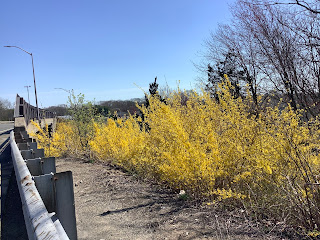Connecticut ninth greenest state, says WalletHub
I am a native Californian so cannot help but enjoy a little pride in the Golden State's #1 green status. But like activists and earthquakes, it is not a surprise. Connecticut, on the other hand, has a looser relationship with environmental policies and commitment.
WalletHub has ranked us #9, sliding from #6 last year. This points out our volatility and unevenness in green practices. It named us #10 for eco-friendly behaviors like gas and water consumption, but a soaring numero dos for climate change contributions, such as nitrous-oxide and methane emissions. A tip of the hat to our neighbor to the north, Vermont, for snagging #2 and New York for securing #3. Vermont has the most organic farm acreage per capita, and New York boasts low gas consumption. In New York, 3.2x as many folks do not drive to work as do in Mississippi, the state with the most drive-to-workers. Vermont also has over 8x as many alternative fuel sites per 100k residents as Louisiana, the state with the lowest number.
We are far less lofty in the air quality category, 37 out of 50. I asked Cassandra Happe, an analyst with WalletHub, what she makes of this.
"It suggests that there are significant concerns regarding pollution levels in our atmosphere," she told me via e-mail. "This ranking emphasizes the need for urgent action to address pollution sources, implement stricter regulations, and promote cleaner technologies to safeguard public health and the environment."
Interestingly, Connecticut ranked #14 for water quality, and in an ironic glass half empty versus full look at our water, Happe said this was pretty good, praising our water management practices including monitoring.
To delve further into the study, I contacted an environmental expert, Dr. Kenneth Gillingham. He is associate dean of academic affairs at Yale School of the Environment and an economics professor. He commented that our water has always been a bit problematic due to industry along rivers, "and many rivers are still polluted from activity years ago."
I wanted to speak to him specifically because of his dual expertise in economics, an area we green types often overlook at our peril.
Following is a transcript of my online interview with Dr. Gillingham:
LW: Does the study reflect your own observations, particularly regarding our ranking #2 in climate contributions? Please substantiate.
KG: Our ranking of #2 in climate contributions seems high, because other states -- such as California, New York, Massachussetts, Vermont and Oregon -- are doing as much, if not more, to reduce emissions; but I agree Connecticut should be in the top tier of states. (Rhode Island took first place in this category. "Rhode Island is up there too!" said Gillingham.)
Also, our state does deserve credit for taking climate change seriously and trying to implement policies to reduce climate change. In particular, Connecticut is especially strong when it comes to energy efficiency policies.
LW: Do you have any data to explain how social pressures in Connecticut affect our environmental choices? For example, in the 'burbs there is a huge stigma toward bus riders. Another way to look at this might be, what percentage of car owners take the bus or give up their cars altogether?
KG: Well, I’m not quite sure exactly what you are looking for here. I have several papers showing how peer influence affects households in Connecticut in the decision of whether to adopt rooftop solar panels, such as this one: https://academic.oup.com/joeg/article/15/4/815/2412599.
Or this one: https://pubsonline.informs.org/doi/abs/10.1287/mksc.2021.1306.
Or this one: https://pubsonline.informs.org/doi/10.1287/mnsc.2020.3840.
As for the question of how to get suburban drivers to take the bus and/or give up their cars altogether, I think that might be a hard sell in Connecticut given the urban form of our cities and the difficulty in getting many places people want to go without a car.
LW: What is urban form?
KG: I am referring to the way cities and towns are built. Are they spread out with the focus on the roads or are they designed for walking and biking?
LW: Please comment on anything in the study that stands out to you, either as true or questionable.
KG: In general, I think the study makes sense. Connecticut is a very green state, but perhaps not the greenest in the country. And we do face air pollution issues, mostly due to our location with winds that blow pollution towards us from the industry in the Rust Belt, as well as New Jersey and New York.
LW: A WalletHub analyst cited that .77% of our population uses public transportation. Is this why we have less than optimum air quality?
KG: Driving within the state certainly contributes, but the main reason our air quality is relatively poor is due to out-of-state pollution blown in. The reason for our public transportation use being so low is that much of the population of the state lives in suburbs or small towns (exurbs), which makes effective public transport more difficult.
LW: Are economic forces less a driver of environmental choices in rich states? Jane Goodall told me we would never solve climate change til we have solved poverty.*
KG: I believe that the fact that Connecticut is one of the wealthiest states in the country contributes to the pro-environmental preferences here. Connecticut is also a very scenic state, with beautiful forests, pastoral landscapes, and coastline. This may contribute to Connecticut residents caring about the environment.
.....
To read the study please visit: https://wallethub.com/edu/greenest-states/11987
Photo of Dr. Kenneth Gillingham used with permission, Yale School of the Environment
*Dr. Goodall was speaking for another news outlet interview I did in 2021.






Comments
Post a Comment